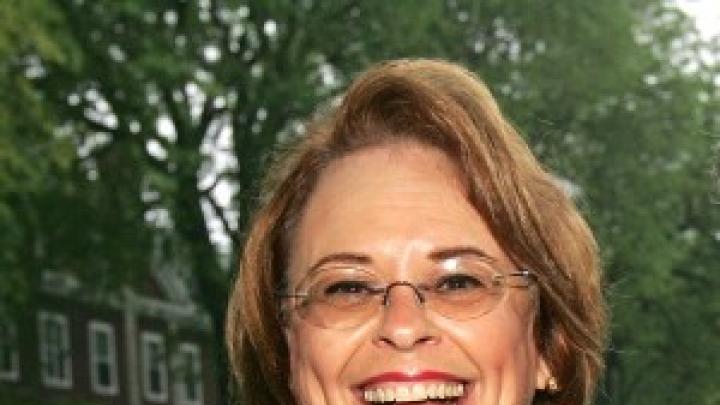On Wednesday, Ann Moore, M.B.A. ’78, told students gathered on the Baker Library Lawn at Harvard Business School (HBS) that she has now attended three HBS Class Day celebrations: twice to speak, and once, last year, for her son’s graduation. But she didn’t go to her own.
“I had moved to New York City to join my husband immediately after attending my last class, and we were too in debt to travel back to pick up my diploma,” Moore said. “Looking back, I wonder, ‘Why was I always in such a hurry to get to work?’”
Moore, the keynote speaker at the May 29 ceremony, was for 33 years a top executive at Time Inc.; that included a stint as chairwoman and CEO from 2002 until 2010, when she left the company. Forbes named her one of the most powerful women in business 10 times. Moore hardly regrets her success, but, she said of that missed Class Day, “I wouldn’t make that mistake, now that I’ve learned to embrace mindfulness.”
New York business culture was radically different in 1978 than it is today, she reported. “I had two things in my first New York office in corporate finance that you won’t find in your offices. First, the absolutely essential adding machine.” The second? A fully stocked liquor cabinet. “For those of us who had young children at home, getting blasted at work wasn’t on the schedule,” she said, adding, “I think working mothers should take some credit for sobering up corporate America. The good old days were not all that great, as I recall them.”
The trick in any career, Moore continued, is finding meaningful and absorbing work. “With meaning,” she said, “any job can become a calling.”
In Moore’s own career—from launching Sports Illustrated for Kids, to overseeing publishing at People and, eventually, all Time Inc. magazines—that took the form of supporting essential journalism.
"For 30-plus years, the chance to work with really clever people, on extraordinary brands, getting paid to read magazines, debating the issues of our time, making a real difference in the world—that was a real joy,” she said. “Who are these people who volunteer to live in a red zone, during a war, or after a nuclear meltdown or tsunami? And who’s going to pay them, if there’s a total disruption to serious news journalists? It was really a pleasure and an honor to work at Time Inc. for almost 35 years. I have my fingers crossed that it’s not too late for them to survive as an independent public company.”
Moore was on campus in April to celebrate the fiftieth anniversary of women at HBS. “I don’t know about you,” she said then, “but I’m not spending my twilight years playing catch-up again. I got through HBS in the ’70s when there wasn’t even a proper ladies room in Aldrich Hall. I played basketball in the ’60s with that stupid three-dribble rule. I had to go out of state for college, because my state school, UVA, was all male. I spent my lifetime catching up—I caught up. So let’s not slip behind again.”
Speaking to a much younger group of HBS degree candidates, Moore said she would have liked to reprise those words, but didn’t. “I knew I had to come up with a new speech today,” she said. “My HBS speech to women alums is still up on YouTube. By the way, it’s quite good.”







